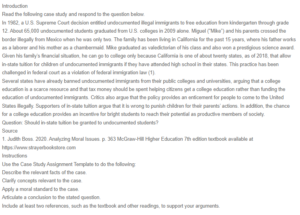Case Study – Criminal Justice Ethics
Facts
- In 1982, The Supreme Court of the United States made a ruling that suggested that undocumented immigrants were entitled to free education from kindergarten through grade 12.
- In 2009 alone, there were approximately 65,000 undocumented students who graduated from US colleges.
- As of 2018, California is among the other 20 states that allow in-state tuition for children of undocumented immigrants on the condition that they have attended high school in their states.
- Opposition has ensued from the Federal court with regard to this practice. The arguments cite the violation of federal immigration law (1).
- There has been a ban from several states barring undocumented students from attending public colleges and universities.
Relevant Concepts
On various occasions, some undocumented immigrants moved to the United States while they were young. On the other hand, even though their parents were undocumented, some were born in the United States (3). It is important to note that undocumented parents also pay taxes to the states they reside in as long as they are working. However, undocumented students may be prone to face various challenges, especially when seeking higher education, based on some of the arguments presented by critics (2). Suppose undocumented students were to be accorded opportunities to further their education without necessarily looking at their residency status. In that case, they can contribute significantly to society and hence make a difference for themselves and their families.
The Selected Standard
The moral standard that is applied in this case revolves around the issue of judgments and/or making conclusions based on an individual’s residency status. Ideally, it is morally and ethically inappropriate to judge undocumented students or deny them the right to proper education based on their parents’ actions (1). In addition, as a society, it is expected that individuals should contribute positively to the economy, and as long as this is achieved, no individual should be denied any opportunity.
Conclusion
In-state tuition should be granted to undocumented students. This conclusion is based on the idea that access to quality education should not be deprived of any individual, irrespective of their residency status (3). From this case study, it is evident that Mike is a bright student who made proper use of the opportunities he was provided with. Suppose the state did not offer the option of in-tuition. In that case, his potential would not have been realized. As a result, this would have deprived him of the opportunity to become an essential member of society. In addition, the government is responsible for taking care of taxpayers. A majority of undocumented immigrants move to the United States to search for better opportunities for themselves and their families. Although they may not have white-collar jobs, they still pay taxes to the government, and hence they should be accorded the same opportunities as every other taxpayer, especially in terms of access to quality education. Besides, a majority of undocumented students were born and raised in the United States, and due to their family’s financial constraints, they may be compelled to depend on the government for support. Consequently, based on the need to have a better life, undocumented students may work extra hard to achieve their dreams, and depriving them of a platform to realize their potential is unethical.
Sources
Boss, J. A. (2019). Ethics for Life: A text with readings, (7th). McGraw-Hill Higher Education.
Boss, J. A. (2020). Analyzing Moral Issues (7th). NY: McGraw-Hill Higher Education.
Nunez, A., & Holthaus, G. (2017). In-state tuition for undocumented students: A policy analysis. Journal of the Student Personnel Association at Indiana University, 47-63.
ORDER A PLAGIARISM-FREE PAPER HERE
We’ll write everything from scratch
Question

Case Study – Criminal Justice Ethics
Introduction
Read the following case study and respond to the question below.
In 1982, a U.S. Supreme Court decision entitled undocumented illegal immigrants to free education from kindergarten through grade 12. About 65,000 undocumented students graduated from U.S. colleges in 2009 alone. Miguel (“Mike”) and his parents crossed the border illegally from Mexico when he was only two. The family has been living in California for the past 15 years, where his father works as a laborer and his mother as a chambermaid. Mike graduated as valedictorian of his class and also won a prestigious science award. Given his family’s financial situation, he can go to college only because California is one of about twenty states, as of 2018, that allow in-state tuition for children of undocumented immigrants if they have attended high school in their states. This practice has been challenged in federal court as a violation of federal immigration law (1).
Several states have already banned undocumented immigrants from their public colleges and universities, arguing that a college education is a scarce resource and that tax money should be spent helping citizens get a college education rather than funding the education of undocumented immigrants. Critics also argue that the policy provides an enticement for people to come to the United States illegally. Supporters of in-state tuition argue that it is wrong to punish children for their parents’ actions. In addition, the chance for a college education provides an incentive for bright students to reach their potential as productive members of society.
Question: Should in-state tuition be granted to undocumented students?
Source
1. Judith Boss. 2020. Analyzing Moral Issues. p. 363 McGraw-Hill Higher Education 7th edition textbook available at https://www.strayerbookstore.com
Instructions
Use the Case Study Assignment Template to do the following:
Describe the relevant facts of the case.
Clarify concepts relevant to the case.
Apply a moral standard to the case.
Articulate a conclusion to the stated question.
Include at least two references, such as the textbook and other readings, to support your arguments.

